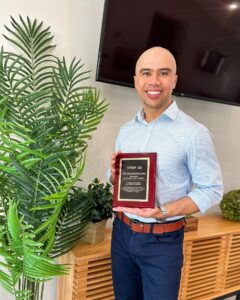Originally published at NCTE.org
This post was written by NCTE Convention first-time attendee Philippe John Sipacio, PhD.
One of the most memorable talks I attended at NCTE 2022 was delivered by Javier Zamora, a Hispanic immigrant who holds several fellowships such as Stegner at Stanford University, Radcliffe at Harvard University, and the National Endowment for the Arts and the Poetry Foundation. His talk was about his inspiring and gripping migration journey chronicled in his memoir, Solito. In a nutshell, Solito is Javier’s nine-year-old self narrating his story about not having a choice but to leave his home village in El Salvador and migrate through Guatemala, Mexico, and the Sonoran Desert. He recounted how his family hired a smuggler to help him cross the border illegally so he could be reunited with his parents living in California at that time. Javier’s story reflects the riveting tale of every immigrant who, like him, pursued and continues to pursue and live the American dream.
Javier shared many pearls of wisdom, but I felt more connected to it when he remembered and acknowledged how he was deeply valued by his first-ever classroom teacher in the US school. He said this teacher never made him feel different from other American schoolchildren or those immigrants who stayed longer and had already culturally and linguistically adjusted in the US. Instead, the teacher made him feel “he belonged,” whether he spoke English or not or understood the content. That sense of belongingness was imprinted in his heart and fueled him to move forward, live what every immigrant dreams in the US, and prosper immensely.
The narrative of Javier affirmed what I have been doing with my current multilingual learners (MLs). That is providing them with a safe and supportive learning environment so that they can feel a sense of belongingness. When my students feel they belong at school, I believe they tend to become more connected to me and the lesson, have higher self-confidence, perform better academically, and more importantly see that their being multilingual is more of a strength in finding their meaning and purpose in life.
As I keep on reflecting on Javier’s journey, I surmised that every ML does not deserve to be solito, or unaccompanied, in their learning journey. As teachers, may it be content, resource, or ESL, we have a responsibility to advocate for the value of every child in our classroom and at school and be a beacon of hope for them no matter what their ethnicity is. While I understand our tedious academic responsibilities, which for one is to ensure that every learner must show progress in every quarter or term, I argue there is a need to establish first a positive school climate to increase students’ sense of belongingness. I believe this is the initial but crucial step that eventually can improve the engagement of students and aid them to perform better academically.
Javier believed he valued his education and life aspirations because he was valued by his teachers first, especially during his transitional years in the US. He may be broken, but he felt better, that he belonged, and braver to pursue the light because he felt the love and support of his teachers and others who believed in him. Essentially, this part of Javier’s story concretizes teaching as the noblest profession. As teachers, we hold the power to empower our students, the strength to strengthen their thinking and other innate abilities, and the boldness to embolden them as they journey toward making their dreams a reality.
Like Javier, MLs have distinct qualities, and these qualities are incomparable. Their intelligence is not boxed. It expands gradually because of their socio-cultural-political experiences. They become a chameleon who easily adapts and thrives in a volatile, uncertain, complex, and ambiguous environment. Their resilience also becomes more well-defined, fueling their pursuit of interest, passion, and excellence. This is the perception of the MLs that I need to value and understand so I can help connect with and teach them better.
Significantly, the value of educating MLs is valuing their value so they can live the American dream and continue to dream with liberation and prosperity. While we teach their minds, we also touch their hearts and transform their lives. I am sure we have little Javiers in our classrooms, and the crucial step of helping them grow is making them not feel solito anymore.

Philippe John F. Sipacio is a highly skilled professional from the Philippines who now lives in North Carolina. He is a multilingual learner specialist in the Public Schools of Robeson County, where he is known for his remarkable teaching methodologies geared toward multilingual learners in the district. It’s no wonder he received the prestigious 2023 Voya Unsung Heroes Award and FOCUS Broadband Education Grant for his excellent work!
Philippe is ready to present his research paper at the 2023 NCTE Annual Convention in Columbus, Ohio. He titled his presentation “Can Core Thinking Routines Enhance the Engagement of Multilingual Learners in English Language Learning?” His presentation is expected to significantly contribute to the ongoing discourse surrounding the education of multilingual learners.
It is the policy of NCTE in all publications, including the Literacy & NCTE blog, to provide a forum for the open discussion of ideas concerning the content and the teaching of English and the language arts. Publicity accorded to any particular point of view does not imply endorsement by the Executive Committee, the Board of Directors, the staff, or the membership at large, except in announcements of policy, where such endorsement is clearly specified.

